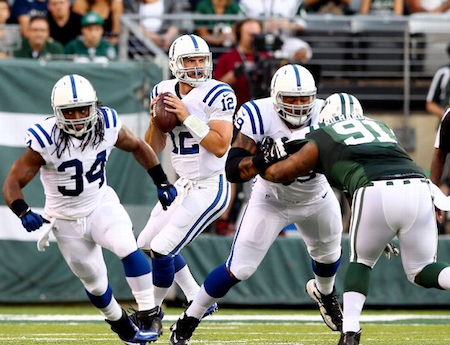Exclusive: Fox, CBS Affils Warn FCC Against Removing Sports Rule

The smarter way to stay on top of broadcasting and cable industry. Sign up below
You are now subscribed
Your newsletter sign-up was successful
Fox and CBS affiliates warn that the FCC could be in danger of balkanizing sports programming and driving it to "increasingly expensive pay cable networks," according to a copy of the letter.
With FCC Chairman Tom Wheeler signaling the FCC is likely to vote by early fall to eliminate the sports blackout rule, broadcasters are working overtime in August to try and stem that tide, including a similar letter sent by state broadcaster associations.
In a letter to FCC Chairman Tom Wheeler dated Aug. 12, the Fox and CBS TV affiliates said eliminating the rule would hurt fans, viewers, localism, and competition.
The rule prevents cable and satellite operators from importing coverage of football and baseball games—it relates primarily to football since most baseball games are already on cable—into a market whose local TV station coverage has been blacked out due to insufficient ticket sales. Blackouts can still be written into contracts, so the FCC rule is essentially a backstop, but an important one say broadcasters and the NFL.
In their letter to the FCC, CBS Affiliate Board Chairman Michael Fiorile and Fox Affiliate Board chairman Jeff Rosser echoed NFL arguments that eliminating the rule would "likely be the first step toward the total elimination of high quality sports – like NFL football games – off free TV and behind the cable paywall."
They said eliminating the rule would not put an end to blackouts, but would threaten local market exclusivity, the "Bedrock" of free, over-the-air local programming. They say it would also result in high prices for pay TV sports fans, and the migration of more big ticket sporting events to pay, which would impact the minority, elderly and low-income populations who are disproportionately over-the-air only TV viewers.
The Sports Fans Coalition, which petitioned the FCC to change the rules, has branded broadcaster and NFL efforts to block the move as a last ditch effort in a debate they have already lost. "Nine nationally reputed sports economists have proven on the record at the FCC that ending the sports blackout rule will not take NFL games off broadcast TV," coalition chairman David Goodfriend told B&C/Multi two weeks ago.
The smarter way to stay on top of broadcasting and cable industry. Sign up below
A copy of the affiliates letter is below.
Dear Chairman Wheeler:
On behalf of the hundreds of local FOX and CBS Television Network Affiliates that serve communities across the country, we write to oppose the Federal Communications Commission’s (FCC) possible elimination of the Sports Blackout Rules (“SBR”) as proposed in the Notice of MB Docket No. 12-3 (released Dec. 18, 2013). For decades, our television stations have proudly produced and broadcasted premier sports programming of local interest, free of charge, via over-the-air broadcast, to everyone and anyone in our communities. Eliminating the SBR will likely be the first step toward the total elimination of high quality sports – like NFL football games – off free TV and behind the cable paywall. The ultimate result of this migration – the balkanization of sports programming to increasingly expensive pay cable networks -- will mean fewer fans have access to the teams they love. And those that can still access the games will be paying more for the privilege.
We, of course, understand sports fans’ frustration with the few sports blackouts that occur – indeed we share that frustration – but eliminating the SBR will neither put an end to local sports blackouts nor provide a benefit to sports fans for three principal reasons.
First, the FCC’s rules do not cause sports blackouts. Instead, the rules simply prevent cable companies from unfairly exploiting a loophole in the copyright laws to the detriment of local TV stations and local viewers. Eliminating the SBR will not put an end to local blackouts, but will instead pose a direct harm to the local broadcaster – contractually bound to blackout particular games -- that would be competing head-to-head with an imported distant signal.
Second, because elimination of the SBR would impede a professional sports league’s ability to control the way its games are distributed, it would disincentivize those sports leagues from carrying their games on free TV. Proponents of eliminating the rules – mostly pay TV interests – argue that sports leagues would never move their premium games to pay TV. That is demonstrably false – as evidenced by the migration of major events like the NBA playoffs, college football championships and more. This ultimate migration would harm those viewers that rely exclusively on broadcast’s free over-the-air access—many of whom are minorities, the elderly, and lower income populations that are underserved by other mediums. It would also lead to higher prices for fans that watch sports on pay TV.
Third, encouraging cable or satellite importation of distant network signals, which the SBR prevents, undermines the bedrock of local broadcasting – local market exclusivity. This exclusivity is critical to our stations’ ability to provide free, locally-focused, over-the-air programming, while serving as a conduit for local economies. The FCC should give serious consideration to the impact that undermining this foundation will have on local viewers and businesses.
In conclusion, elimination of the SBR would harm sports fans, broadcast viewers, and localism, and we respectfully request that you maintain this important competitive and consumer policy.
(Photo Credit: Elsa/Getty Images)
Contributing editor John Eggerton has been an editor and/or writer on media regulation, legislation and policy for over four decades, including covering the FCC, FTC, Congress, the major media trade associations, and the federal courts. In addition to Multichannel News and Broadcasting + Cable, his work has appeared in Radio World, TV Technology, TV Fax, This Week in Consumer Electronics, Variety and the Encyclopedia Britannica.

